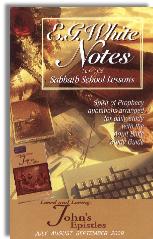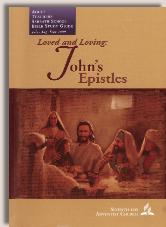|
||||||||||||||
Commentary on "Living as Children of God"
Day 4: Tuesday, August 11, 2009
Today's lesson begins with a definition of sin. As is typical in all of SDA literature, the definition of sin is lawlessness, as stated in 1st John 3:4. That is true. However, the resulting conclusions that are stated in the lesson conflict with the assurance of salvation that John speaks of elsewhere in his letters.
It is stated on page 82 of the Teacher's Quarterly that “John emphasizes that our future depends on how we live now.” Later, in the same paragraph it is stated that “We are saved by grace alone, but our lives must reflect that we are saved.”
This is a double-standard. To what degree must our lives reflect that we are saved? As the SDA Church teaches that the Ten Commandments are a reflection of the character of God, it is often pointed out that keeping the commandments is the way in which we demonstrate that we are a Christian.
As Paul has taught in Philippians and elsewhere, his own perfect keeping of the law was as rubbish. He says in Philippians 3:6-9:
...as to the righteousness which is in the Law, found blameless. But whatever things were gain to me, those things I have counted as loss for the sake of Christ. More than that, I count all things to be loss in view of the surpassing value of knowing Christ Jesus my Lord, for whom I have suffered the loss of all things, and count them but rubbish so that I may gain Christ, and may be found in Him, not having a righteousness of my own derived from the Law, but that which is through faith in Christ, the righteousness which comes from God on the basis of faith.
The law had a very specific purpose for the nation of Israel, yet it is in the New Testament that we learn the true nature of the law. 2 Corinthians 3:7 makes plain that the letters that were engraved on stone, specifically referring to the Ten Commandments were a ministry of death, not life.
2 Cor. 3:7-8 contrasts the work of the law with the work of the Spirit. “But if the ministry of death, in letters engraved on stones, came with glory, so that the sons of Israel could not look intently at the face of Moses because of the glory of his face, fading as it was, how will the ministry of the Spirit fail to be even more with glory?”
To continue looking to the law for the purpose of righteousness is actually putting a veil over our hearts in such a way that it can dampen the effect of the Holy Spirit. This is made very clear in 2 Corinthians 3:15-18:
But to this day whenever Moses is read, a veil lies over their heart; but whenever a person turns to the Lord, the veil is taken away. Now the Lord is the Spirit, and where the Spirit of the Lord is, there is liberty. But we all, with unveiled face, beholding as in a mirror the glory of the Lord, are being transformed into the same image from glory to glory, just as from the Lord, the Spirit.
This liberty is not, as some claim, the liberty to sin. It is the liberty to be open to the leading of the Holy Spirit, who writes his law on our hearts day by day, moment by moment, giving guidance for every situation in which we find ourselves.
At the bottom of the page for today's lesson, the question is asked, “What’s your favorite sin?” The remainder of the paragraph simply focuses on that particular favorite sin. This is a practice that this writer has seen in previous Sabbath School Quarterlies. We do not purify ourselves by focusing on and contemplating our sin. As was pointed out in yesterday's lesson, we purify ourselves by looking to Christ and hoping in the soon coming of our Lord. 1 John 3:3 states, “And everyone who has this hope fixed on Him purifies himself, just as He is pure.”
You do not purify yourself by focusing on sin. You purify yourself by allowing the Holy Spirit to lead you into a more holy life.
Summary
- Sin is lawlessness, but it is not the law that brings righteousness.
- The law, specifically the ten commandments, are referred to by scripture as a “ministry of death.”
- Focusing on the law for how to live actually results in a veil being placed over our hearts. When we behold Jesus, the Holy Spirit can perform his work of transforming us from glory to glory, as is stated in 2 Cor. 3:15-18
- Focusing on your favorite sin is unhealthy and does nothing to overcome that sin. Following the leading of the Holy Spirit and asking him for his strength during those times is how one is given the liberty to overcome the snares of the enemy.
Day 4: Tuesday, August 11, 2009
Overview: “What’s your favorite sin? That is, what sin do you find yourself continually indulging in? What are the ways in which you justify it in your mind? How much less sinful does it seem with each passing year? When are you going to wake up and realize that sooner or later, unless you claim God’s power to overcome it, it will destroy you?”
Problems: Is the author serious? (Which author wrote this, the “good cop” or “bad cop”?) Is this set of “thought” questions at the end of the section the best he could do in the context of being a child of Almighty God? Haven’t we all learned by painful experience that the more we focus on sin the worse “sinners” we become?
However, 1 John 3:4 is a favorite Adventist verse. I myself was kept in bondage to it for years, agonizing over every failure to live up to what I thought God wanted of me. I lost count of the number of times I claimed Psalm 51. I’d fall, I’d confess, I’d get up and dust myself off, I’d try again, and then I’d run the circle one more time, time after time, year after year until I was physically ill from all the trying. I thought the only thing left was to curse God and die, or find a way to justify it all in my mind. Of course, neither of these approaches worked either.
And then, someone suggested I read the rest of the chapter.
The “lawlessness” referred to in Verse 4 is not rebellion against the Ten Commandments. It’s not even talking about the Ten Commandments. It refers to Verse 23 – “This is His [God’s] commandment, that we believe in the name of His Son Jesus Christ, and love one another, just as He commanded us.”
It is tragic to note that the author refers to the “commandments” mentioned in 1 John 3:22 and 24, but purposely skips Verse 23 which defines the commandments John is talking about. This is a clear example of wresting scripture to mean something other than is clearly taught in the passage.
Sin is unbelief in Jesus (John 16:9). Every action, therefore, done while rejecting Jesus is sinful, even things we’ve been told are good. This is why God says to the imposters, “I never knew you; depart from me, you who practice lawlessness” (Matthew 7:23).
The author also makes a weak point regarding the error about which John wrote this letter. He uses words like “may have” and “may not have” to describe the false teachers. There is nothing “may have” about this letter. The false teachers were lost and on their way to hell. They were antichrists, and he was warning the church about them.
The heresy John deals with is an early, though reasonably well developed, form of Gnosticism. Gnostics believed that spirit was “good” and matter or physicality was “bad”. Because of this, they believed Jesus either wasn’t human (He must remain spirit), or they believed He was human and, therefore, not Divine. John dealt with these two errors in his two descriptions of antichrist.
The specific error confronted in 1 John 3:4 was the claim that believers could reach a state of spiritual enlightenment that removed all vestige of sin. (This is related to the error he corrected in 1 John 1:8-9.) In fact, the goal was to become completely spiritual through a long series of secret rituals built around mysteries supposedly understood only by special people. Some proponents of this heresy decided that since their bodies were evil, and would always be so, they might as well enjoy themselves. They tended to engage in all manner of sexual perversion and gluttony. Other proponents of this heresy decided that the body must be kept in utter subjection. They forsook marriage, society, and most anything else we would consider normal living. In both cases, the Gnostics were behaving completely selfishly and judging those who did not believe and behave as they did as lesser humans not worthy of their concern.
John blows away their belief system, and both extremes of behavior related to it, in this part of his letter. Sin is lawlessness, not physicality. Lawlessness has to do with rejection of Jesus and failure to love others as He loves us.
Sin is so much more than sexual immorality or drunkenness or sassing our parents or bowing to an idol. Sin can be giving a cup of cold water to someone, or fixing someone’s car when they don’t have the money, or even leading someone to Jesus. What makes sin so sinful is that we assume the rights and privileges of God Himself. We completely pervert what it means to be His child by trying to put Him in our debt, as if He owes us something for our good behavior. Therefore, anything we do in our own strength is sin, that is, rebellion against Jesus.
Summary
- The focus on behavior is a bankrupt approach. Our behavior never can be counted on to reveal anything other than our failure to live consistently with our identity.
- Understanding the heresy that John was trying to correct explains 1 John 3:4 and the following verses perfectly.
- 1 John 3:4 does not refer to the Ten Commandments. It refers to Jesus’ new commands – to believe in Him and to love as we’ve been loved. (Note: This is explicitly not the same as Jesus’ answer to the question, “Which is the greatest commandment?” Jesus’ answer to that question perfectly described the Mosaic covenant. His new command perfectly describes the New Covenant.)
Copyright 2008 BibleStudiesForAdventists.com. All rights reserved. Revised August 10, 2009. This website is published by Life Assurance Ministries, Glendale, Arizona, USA, the publisher of Proclamation! Magazine. Contact email: BibleStudiesForAdventists@gmail.com.
The Sabbath School Bible Study Guide and the corresponding E.G. White Notes are published by Pacific Press Publishing Association, which is owned and operated by the Seventh-day Adventist church. The current quarter's editions are pictured above.
Official Adventist Resources
Standard Edition Study Guide Week 7
Teacher's Edition Study Guide Week 7
Easy Reading Edition Study Guide Week 7
Search the Complete Published Ellen G. White Writings


